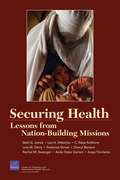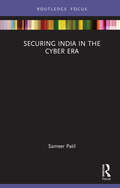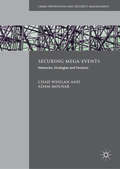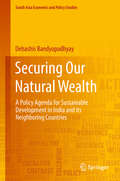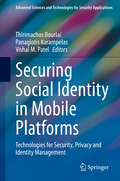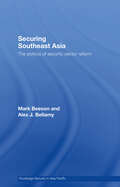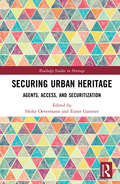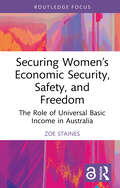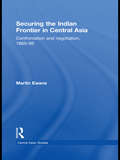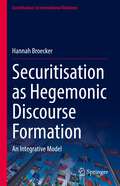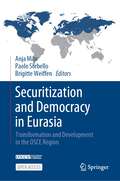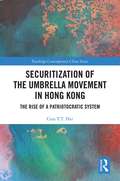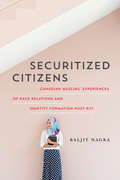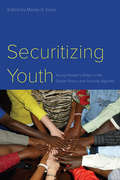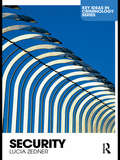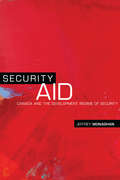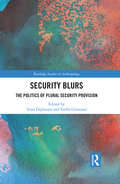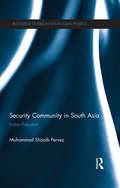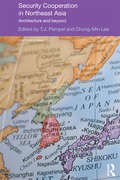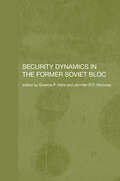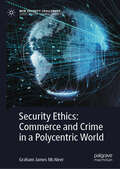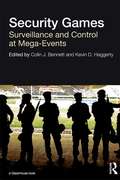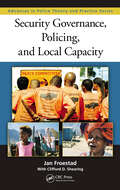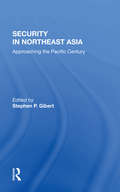- Table View
- List View
Securing Health: Lessons from Nation-building Operations
by Seth G. Jones Lois M. Davis Federico Girosi Lee H. Hilborne C. Ross AnthonyRAND researchers analyzed the health components of seven post-World War II nation-building efforts conducted after major conflicts--Germany, Japan, Somalia, Haiti, Kosovo, Afghanistan, Iraq--and found that two factors are correlated with successful health outcomes: planning and coordination, and infrastructure and resources.
Securing India in the Cyber Era (The Gateway House Guide to India in the 2020s)
by Sameer PatilThis book explores the geopolitics of the global cyber space to analyse India’s cyber security landscape. As conflicts go more online, nation-states are manipulating the cyber space to exploit each other’s dependence on information, communication, and digital technologies. All the major powers have dedicated cyber units to breach computer networks, harvest sensitive data and proprietary information, and disrupt critical national infrastructure operations The volume reviews threats to Indian computer networks, analyses the country’s policy responses to these threats, and suggests comprehensive measures to build resilience in the system. India constitutes the second largest internet user base in the world, and this expansion of the user base also saw an accompanying rise in cybercrimes. The book discusses how the country can protect this user base, the data-dependent critical infrastructure, build resilient digital payment systems, and answer the challenges of the dark net. It also explores India’s cyber diplomacy, as an emerging economy with a large IT industry and a well-established technological base. Topical and lucid, this book as part of The Gateway House Guide to India in the 2020s series will be of interest to scholars and researchers of cyber security, digital diplomacy, foreign policy, international relations, geopolitics, strategic affairs, defence studies, South Asian politics, and international politics.
Securing Mega-Events: Networks, Strategies and Tensions (Crime Prevention and Security Management)
by Chad Whelan Adam MolnarMega-events such as the Olympic Games, World Cup finals and international political summits are occasions of almost unparalleled economic, political and social significance for host nations and cities. The scale and scope of mega-event security has continued to grow enormously since 11 September 2001, consistently involving the largest policing and security operations for event hosts outside of wartime. This book is the first to focus exclusively on the organisational dynamics underpinning the design and delivery of mega-event security. Using the G20 Summit in Brisbane, Australia in November 2014 as a case study, in conjunction with comparisons with events such as the Toronto 2010 G20, the authors engage in a comprehensive assessment of the networks, strategies and tensions involved in mega-event security. By drawing on the insightful experiences of those responsible for securing the Brisbane 2014 G20, the authors look behind-the-scenes to capture the complexity of mega-event security. The authors argue that such an approach is essential to better appreciate how different conceptions of security, ways of thinking and acting, impact a range of security ideals and outcomes.
Securing Our Natural Wealth: A Policy Agenda for Sustainable Development in India and for Its Neighboring Countries (South Asia Economic and Policy Studies)
by Debashis BandyopadhyayThis book explores various aspects of Intellectual Property Rights (IPR) regimes with regard to plant-variety protection and farmers’ rights; traditional knowledge; geographical indications, genetically modified crops; and access to genetic resources within the broad ambit of Trade-Related Aspects of Intellectual Property Rights (TRIPS), the Convention of Biological Diversity and other treaties/protocols. Enumerating the governance provisions for India and some of its neighboring countries, including Nepal, Sri Lanka, Bangladesh, Bhutan, Thailand and Myanmar, the book synthesizes a policy agenda to drive sustainable development. Further, it assesses and interprets the status quo, and discusses key issues and implications. By comparing various governance frameworks in South Asian countries, it attempts to bridge policy issues concerning development, IPR and international studies.
Securing Rights for Victims
by Robert C. Davis Julie Whitman James M. Anderson Susan HowleyThis book discusses how some clinics have won significant gains at the appellate and federal court levels concerning victim standing, the rights to be consulted and heard, and the right to privacy. Some have won significant victories in gaining standing for victims and expanding the definition of particular rights. Others are enjoined in the battle. But all have raised awareness of victims' rights in the justice system.
Securing Social Identity in Mobile Platforms: Technologies for Security, Privacy and Identity Management (Advanced Sciences and Technologies for Security Applications)
by Vishal M. Patel Panagiotis Karampelas Thirimachos BourlaiThe book presents novel research in the areas of social identity and security when using mobile platforms. The topics cover a broad range of applications related to securing social identity as well as the latest advances in the field, including the presentation of novel research methods that are in the service of all citizens using mobile devices. More specifically, academic, industry-related and government (law enforcement, intelligence and defence) organizations, will benefit from the research topics of this book that cover the concept of identity management and security using mobile platforms from various perspectives, i.e. whether a user navigates to social media, accesses their own phone devices, access their bank accounts, uses online shopping service providers, accesses their personal documents or accounts with valuable information, surfs the internet, or even becomes a victim of cyberattacks. In all of the aforementioned cases, there is a need for mobile related technologies that protect the users’ social identity and well-being in the digital world, including the use of biometrics, cybersecurity software and tools, active authentication and identity anti-spoofing algorithms and more.
Securing Southeast Asia: The Politics of Security Sector Reform (Routledge Security in Asia Pacific Series #Vol. 6)
by Mark Beeson Alex BellamyThis book uniquely applies the security reform agenda to Southeast Asia. It investigates recent developments in civil-military relations in the region, looking in particular at the impact and utility of the agenda on the region and assessing whether it is likely to help make the region more stable and less prone to military interventions. It provides an historical overview of the region’s civil-military relations and goes on to explore the dynamics of civil-military relations within the context of the security sector reform framework, focusing on the experiences of four of the region’s militaries: Malaysia, Thailand, the Philippines and Indonesia. It argues that although regional militaries have not necessarily followed a ‘Western’ model, significant developments have occurred that are broadly in keeping with the security sector reform agenda, and which suggests that the prospects for stable civil-military relations are brighter than some sceptics believe.
Securing Urban Heritage: Agents, Access, and Securitization
by Heike Oevermann Eszter GantnerSecuring Urban Heritage considers the impact of securitization on access to urban heritage sites. Demonstrating that symbolic spaces such as these have increasingly become the location of choice for the practice and performance of contemporary politics in the last decade, the book shows how this has led to the securitization of urban public space. Highlighting specific changes that have been made, such as the installation of closed-circuit television or the limitation of access to certain streets, plazas and buildings, the book analyses the impact of different approaches to securitization. Claiming that access to heritage sites is a precursor to an informed and thorough understanding of heritage, the editors and contributors to this volume argue that new forms of securing urban heritage, including community involvement and digitalization, offer possibilities for the protection and use of urban heritage. Looking more closely at the versatile relationship between access and securitization in this context, the book provides a theoretical framework for the relationship between urban heritage and securitization. Comparing case studies from cities in Angola, Bulgaria, Eritrea, France, Germany, Hungary, Italy, Japan, Latvia, Mexico, Norway, Russia, Suriname, Sweden, Turkey, UK, and the US, the book reveals some of the key mechanisms that are used to regulate access to heritage sites around the world. Providing much-needed insight into the diverse challenges of securitization for access and urban heritage, Securing Urban Heritage should be essential reading for academics, students, and practitioners from the fields of heritage and urban studies, architecture, art history, conservation, urban planning, and urban geography.
Securing Women’s Economic Security, Safety, and Freedom: The Role of Universal Basic Income in Australia
by Zoe StainesUniversal basic income (UBI) as a policy measure for supporting economic security has attracted worldwide attention. This book contributes to the discussion by focusing on UBI’s potential impacts for women, including women of colour and First Nations women.Utilizing a “scenario interviewing” approach, the author worked with 26 diverse Australian women to imagine the potential implications of UBI for their own lives, as well as for women more broadly. The women talked about a range of possible impacts including poverty reduction, economic security, improved autonomy, and freedom from violence, which are sorted into overarching themes and chapters. Integrating these women’s narratives into the key arguments for and against UBI, this book provides a robust and readable introduction to relevant literature.This book is suitable for a wide audience including scholars and students across the social sciences, as well as policymakers.
Securing the Indian Frontier in Central Asia: Confrontation and Negotiation, 1865-1895 (Central Asian Studies)
by Martin EwansThe three decades between 1865 and 1895 marked a particularly contentious period in the relationship between Britain and Russia in Central Asia, which more than once brought them to the verge of war. Moderates tried to settle the problem by the negotiation of ‘neutral zones’, or firm boundaries, but the issue was complicated by misreading of intentions, much internal confusion and dispute, and considerable ignorance of the geographical and geopolitical factors involved. This careful and detailed analysis examines the strategic thinking and diplomatic discourse which underlay the whole period, and in particular of the succession of efforts to establish a frontier, which eventually brought the period to a close without a major confrontation being provoked. Based on relevant records in the PRO and the British Library, as well as private papers, press comment, parliamentary debates and other contemporary accounts, Sir Martin Ewans provides a ‘history of thought' of this crucial period in Central Asia. He provides an insight into the manner in which issues of war and peace were handled in the 19th Century and a fascinating case study of a great power relationship prior to the First World War. An important contribution to the study of Asian history, Tsarist Russia, imperial history and the history of British India, this book will also be of interest in India and Pakistan as a study of the events that led to the definition and consolidation of their northern frontiers.
Securitisation as Hegemonic Discourse Formation: An Integrative Model (Contributions to International Relations)
by Hannah BroeckerThis book offers a model for understanding securitization in terms of hegemonic discourse formations. It re-thinks the very meaning of security as well as the relationship between the understanding of security in traditional and critical approaches in security studies to find a common denominator between them. Deduced firmly from realist political philosophy and its analytic categories, such as state-based sovereignty, security is presented as a function of discursive formations. Providing a sound discourse-theoretical foundation which includes both linguistic and non-linguistic practices as well as a focus on relationships of power, the book offers a basis for the integration of insights generated by the different approaches to securitisation, and enhances the analytical and explanatory depth of the concept. As part of its theoretical foundation, the book further presents a fundamentally new image of long-standing theoretical and conceptual challenges within speech-act inspired approaches, including the re-formulation of central analytical categories such as the speaker-audience-context nexus. By explaining securitisation as signifying the boundaries of the construction of meaning, it presents an original understanding of securitisation, which is deeply integrated into the structures of the social construction of meaning. On this basis, the book offers a new understanding of successful securitisation factors and insights into aspects that render specific objects more or less likely for securitisation. The book proceeds to discuss two central aspects of the securitisation debate: The constitution of power, as well as an exploration of the nature of the political and politicisation. An empirical case study on the development-security-nexus offers further insights into the applicability of the theoretical model. This book will appeal to students, researchers, and scholars of political science and international relations (IR) interested in a better understanding of IR theory, realism, critical security studies, and discourse analysis.
Securitization and Democracy in Eurasia: Transformation and Development in the OSCE Region
by Anja Mihr Brigitte Weiffen Paolo SorbelloThis open-access book presents cutting-edge research on securitization and democratic development in the OSCE Region. Gathering contributions by practitioners and researchers from various disciplines, it presents case studies and highlights recent activities of proactive engagement in democratic institution-building and responding to security threats from the Balkans to Central Asia. The volume is divided into three parts, the first of which focuses on security-related matters, armed conflicts, minorities, and women’s safety, as well as the roles that civil society, foreign governments, social media, and external donors play in this area. These contributions illustrate how the OSCE’s informal approach to peace, security, and securitization as norm entrepreneur is closely linked to the level of democracy among its member states. The second part presents a special section on the political implications of China’s Belt and Road Initiative (BRI), assessing the impact of this infrastructural program on the levels of democracy and/or autocracy in Eurasia. The third part consists of short chapters outlining future research and debates. The book will appeal to students and scholars of international relations, security studies, and the human rights-politics nexus. This is the 2022 instalment in a series of books released by the OSCE Academy in Bishkek. The OSCE works to promote Minority Protection, Security, Democratic Development and Human Rights, guided by the Office for Democratic Institutions and Human Rights (ODIHR), and to enhance securitization and development policies in Eurasia, Europe, Central Asia and North America. Since being founded in 1993, the OSCE and its agencies and departments have attracted a wealth of academic research in various fields and disciplines, ranging from economic development and election monitoring to enhancing global principles of human rights and securitization.
Securitization of the Umbrella Movement in Hong Kong: The Rise of a Patriotocratic System (Routledge Contemporary China Series)
by Cora Y.T. HuiIn recent years, the city many hoped would help democratize China has instead become a research setting in which to study China’s increasing intolerance of dissent. Since Hong Kong’s return to Chinese sovereignty in 1997, China’s treatment of Hong Kong could be divided into three stages: non-intervention, intervention, and securitization. If the July 1 march in 2003 is a watershed that marked Beijing’s change from non-intervention to intervention, this book suggests that the Umbrella Movement in 2014 is another watershed that marked Beijing’s change from intervention to securitization. This book is a theoretically driven case study of the Umbrella Movement, a massive sit-in that paralyzed key business and retail districts for 79 days in Hong Kong in 2014. Many Hongkongers believe that they have the right to a fair election of the chief executive, and Beijing’s insistence on vetting candidates prompted the outbreak of the Umbrella Movement. Drawing insights from the securitization theory and fear appeal literature, the book proposes the framework of “security appeal.” It argues that the outbreak of the Umbrella Movement resulted from a premature use of hard repression, that is, before the government convinced the general public that the Umbrella Movement was a threat. The eventual successful securitization entails a general acceptance of the threatening nature of the Umbrella Movement and agreement with its crackdown. This book concludes that one of the consequences of the securitization of the Umbrella Movement is Beijing’s eventual switch to the policy of “patriotocracy” – a system that allocates power and resources based on one’s professed patriotism – in lieu of One Country, Two Systems. The policy implications and theoretical and methodological contributions of this book will be of interest to scholars and students of security studies; Chinese politics; and various social science disciplines, including political science, psychology, criminology, and sociology.
Securitized Citizens: Canadian Muslims’ Experiences of Race Relations and Identity Formation Post–9/11
by Baljit NagraUninformed and reactionary responses in the years following the events of 9/11 and the ongoing ‘War on Terror’ have greatly affected ideas of citizenship and national belonging. In Securitized Citizens, Baljit Nagra, develops a new critical analysis of the ideas dominant groups and institutions try to impose on young Canadian Muslims and how in turn they contest and reconceptualize these ideas. Nagra conducted fifty in-depth interviews with young Muslim adults in Vancouver and Toronto and her analysis reveals how this group experienced national belonging and exclusion in light of the Muslim ‘other’, how they reconsidered their cultural and religious identity, and what their experiences tell us about contemporary Canadian citizenship. The rich and lively interviews in Securitized Citizens successfully capture the experiences and feelings of well-educated, second-generation, and young Canadian Muslims. Nagra acutely explores how racial discourses in a post–9/11 world have affected questions of race relations, religious identity, nationalism, white privilege, and multiculturalism.
Securitizing Youth: Young People’s Roles in the Global Peace and Security Agenda
by Jeni Klugman Victoria Bishop Nasrat Khalid Valeria Izzi Carole MacNeil Ali Altiok Willice Onyango Grace Atuhaire Matthew Moore Diana BudurSecuritizing Youth offers new insights on young people’s engagement in a wide range of contexts related to the peace and security field. It presents empirical findings on the challenges and opportunities faced by young women and men in their efforts to build more peaceful, inclusive, and environmentally secure societies. The chapters included in this edited volume examine the diversity and complexity of young people’s engagement for peace and security in different countries across the globe and in different types and phases of conflict and violence, including both conflict-affected and relatively peaceful societies. Chapter contributors, young peacebuilders, and seasoned scholars and practitioners alike propose ways to support youth’s agency and facilitate their meaningful participation in decision-making. The chapters are organized around five broad thematic issues that correspond to the 5 Pillars of Action identified by UN Security Council Resolution 2250. Lessons learned are intended to inform the global youth, peace, and security agenda so that it better responds to on-the-ground realities, hence promoting more sustainable and inclusive approaches to long-lasting peace.
Security
by Lucia ZednerJust a decade ago security had little claim to criminological attention. Today a combination of disciplinary paradigm shifts, policy changes, and world political events have pushed security to the forefront of the criminological agenda. Distinctions between public safety and private protection, policing and security services, national and international security are being eroded. Post-9/11 the pursuit of security has been hotly debated not least because countering terrorism raises the stakes and licenses extraordinary measures. Security has become a central plank of public policy, a topical political issue, and lucrative focus of private venture but it is not without costs, problems, and paradoxes. As security governs our lives, governing security become a priority. This book provides a brief, authoritative introduction to the history of security from Hobbes to the present day and a timely guide to contemporary security politics and dilemmas. It argues that the pursuit of security poses a significant challenge for criminal justice practices and values. It defends security as public good and suggests a framework of principles by which it might better be governed. Engaging with major academic debates in criminology, law, international relations, politics, and sociology, this book stands at the vanguard of interdisciplinary writing on security.
Security Aid: Canada and the Development Regime of Security
by Jeffrey MonaghanCanada is actively involved through various agencies in the domestic affairs of countries in the Global South. Over time, these practices – rationalized as a form of humanitarian assistance − have become increasingly focused on enhancing regimes of surveillance, policing, prisons, border control, and security governance. Drawing on an array of previously classified materials and interviews with security experts, Security Aid presents a critical analysis of the securitization of humanitarian aid. Jeffrey Monaghan demonstrates that, while Canadian humanitarian assistance may be framed around altruistic ideals, these ideals are subordinate to two overlapping objectives: the advancement of Canada’s strategic interests and the development of security states in the “underdeveloped” world. Through case studies of the major aid programs in Haiti, Libya, and Southeast Asia, Security Aid provides a comprehensive analysis and reinterpretation of Canada’s foreign policy agenda and its role in global affairs.
Security Blurs: The Politics of Plural Security Provision (Routledge Studies in Anthropology)
by Erella Grassiani Tessa DiphoornSecurity Blurs makes an important contribution to anthropological work on security. It introduces the notion of “security blurs” to analyse manifestations of security that are visible and identifi able, yet constructed and made up of a myriad and overlapping set of actors, roles, motivations, values, practices, ideas, materialities and power dynamics in their inception and performance. The chapters address the entanglements and overlaps between a variety of state and non-state security providers, from the police and the military to vigilantes, community organisations and private security companies. The contributors offer rich ethnographic studies of everyday security practices across a range of cultural contexts and reveal the impact on the lives of ordinary citizens. This book presents a new anthropological approach to security by explicitly addressing the overlap and entanglement of the practices and discourses of state and non-state security providers, and the associated forms of cooperation and confl ict that permit an analysis of these actors’ activities as increasingly “blurred”.
Security Community in South Asia: India - Pakistan (Routledge Studies in South Asian Politics)
by Muhammad Shoaib PervezThe security relationship between India and Pakistan is generally viewed through a neo-realist approach of International Relations.. Treading on a different path, this book explains the rivalry of these countries by looking at the socio-cultural norms found at two levels, elites versus popular. Furthermore, it also conceptualizes a hypothetical India-Pakistan security community that could result in peace in the region. The book describes how the rivalry between India and Pakistan is mostly centred on the elites of the two countries. It highlights the presence of a unique normative structure through social practices found at the popular level, and looks at how the common people of both India and Pakistan share many socio-cultural norms. Employing the theoretical framework of social constructivist approach of International Relations as well as the methodology of critical discourse analysis, the book discusses how an effort can be made to develop the concept of a bottom-up security community, from the popular to the elite level, and the impact this would potentially have for India and Pakistan. An interesting and valuable approach for analysing these issues of security through the socio-cultural lens, this book is of interest to academics and scholars of South Asian Politics, Security Studies and International Relations.
Security Cooperation in Northeast Asia: Architecture and Beyond (Politics in Asia)
by T. J. Pempel Chung-Min LeeDefining and conceptualizing Northeast Asia’s security complex poses unique quandaries. The security architecture in Northeast Asia to date has been predominately U.S.-dominated bilateral alliances, weak institutional structures and the current Six Party Talks dealing with the North Korean nuclear issue. There has been a distinct lack of desire among regional countries as well as the U.S. to follow in the footsteps of Europe with its robust set of multilateral institutions. However, since the late 1990s, there has been burgeoning interest among regional states towards forming new multilateral institutions as well as reforming and revitalizing existing mechanisms. Much of this effort has been in the economic and political arenas, with the creation of bodies such as the East Asian Summit, but there have also been important initiatives in the security sphere. This book offers detailed examinations about how this potentially tense region of the world is redefining certain longstanding national interests, and shows how this shift is the result of changing power relations, the desire to protect hard-won economic gains, as well as growing trust in new processes designed to foster regional cooperation over regional conflict. Presenting new and timely research on topics that are vital to the security future of one of the world’s most important geographical regions, this book will be of great value to students and scholars of Asian politics, regionalism, international politics and security studies.
Security Dynamics in the Former Soviet Bloc
by Jennifer D. P. Moroney Graeme P. HerdSecurity Dynamics in the Former Soviet Bloc focuses on four former Soviet sub-regions (the Baltic Sea region, the Slavic republics, the Black Sea region, and Central Asia) to explore the degree to which 'democratic security', which includes de-politicisation of, and civilian oversight of, the military, resolution of conflicts by international cooperation, and involvement in international organisations. It examines how far states in these regions have developed cooperative foreign and security policies towards their immediate neighbours and key Western states and organisations, explores the interplay between internal and external aspects of democratic security building, and uses case-study examples to show how inter-state bi-lateral and multi-lateral relations are developing.
Security Ethics: Commerce and Crime in a Polycentric World (New Security Challenges)
by Graham James McAleerThis book explores criminal threat to commercial security and the problem of the ethical control of political and criminal risk alongside and in the absence of government. Theoretically, it links ethics to geopolitics and political economy. Security Ethics: Commerce and Crime in a Polycentric World builds from well-known thinkers, but not theorists typically found in books of applied ethics and security studies. Chapters include Francisco de Vitoria&’s account of just war applied to pirates; John Locke on dignity and the illegal trade in body parts; David Hume on community justice combatting cartels; Adam Smith on luxury and knockoffs; Bakunin and anarchist gunrunning; Johan Huizinga on play and crime; David Ross on corporate obligation in the face of partizan risk to hotel security; Carl Schmitt on geography and smuggling; Aurel Kolnai on privilege and corporate secrets; and David Petraeus, author of The US Army/Marine Corps Counterinsurgency Field Manual, respecting ecotage and commercial legitimacy.
Security Games: Surveillance and Control at Mega-Events
by Kevin D. Haggerty Colin J. BennettSecurity Games: Surveillance and Control at Mega-Events addresses the impact of mega-events – such as the Olympic Games and the World Cup – on wider practices of security and surveillance. "Mega-Events" pose peculiar and extensive security challenges. The overwhelming imperative is that "nothing should go wrong." There are, however, an almost infinite number of things that can "go wrong"; producing the perceived need for pre-emptive risk assessments, and an expanding range of security measures, including extensive forms and levels of surveillance. These measures are delivered by a "security/industrial complex" consisting of powerful transnational corporate, governmental and military actors, eager to showcase the latest technologies and prove that they can deliver "spectacular levels of security". Mega-events have thus become occasions for experiments in monitoring people and places. And, as such, they have become important moments in the development and dispersal of surveillance, as the infrastructure established for mega-events are often marketed as security solutions for the more routine monitoring of people and place. Mega-events, then, now serve as focal points for the proliferation of security and surveillance. They are microcosms of larger trends and processes, through which – as the contributors to this volume demonstrate – we can observe the complex ways that security and surveillance are now implicated in unique confluences of technology, institutional motivations, and public-private security arrangements. As the exceptional conditions of the mega-event become the norm, Security Games: Surveillance and Control at Mega-Events therefore provides the glimpse of a possible future that is more intensively and extensively monitored.
Security Governance, Policing, and Local Capacity (Advances in Police Theory and Practice)
by Clifford Shearing Jan FroestadThe security governance of South Africa has faced immense challenges amid post-apartheid constitutional and political transformations. In many cases, policing and governmental organizations have failed to provide security and other services to the poorest inhabitants. Security Governance, Policing, and Local Capacity explores an experiment that too
Security In Northeast Asia: Approaching The Pacific Century
by Stephen P GibertThis book presents to the reader a comprehensive and integrated discussion of the Northeast Asian-Western Pacific region and its relationships to United States and world security concerns and international political stability.
